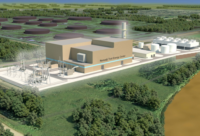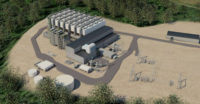A Wisconsin judge has determined that state regulators acted appropriately in granting a construction permit for the Nemadji Trail Energy Center, a proposed $700 million combined-cycle natural gas energy plant that has drawn opposition from environmental groups, despite proponents’ assertions that the facility will help accelerate a transition to clean energy.
The 625MW plant, to be located in an industrial area of Superior, Wis., is being developed jointly by electric utilities in Wisconsin, Minnesota, and North Dakota. According to public information, Nemadji Trail’s use of natural gas will allow the utilities to increase their renewable energy resources and phase out coal-fired power plants.
Shortly after the Wisconsin Public Service Commission approved the project in February 2020, Clean Wisconsin and the Sierra Club lodged a legal challenge to the project, claiming that regulators had failed to fully consider potential air and water quality impacts, as well as concerns that that the facility could stress an area water supply aquifer.
Dane County, Wis., Circuit Court Judge Jacob Frost rejected those arguments, ruling on May 17 that the permitting process for the plant had been lawful, as it was solely up to the commission “to weigh evidence and assess the credibility of witnesses.”
Dairyland Power Cooperative of La Crosse, Wis., one of the utilities that will own and operate the Nemadji Trail facility, issued a statement expressing satisfaction with the ruling, adding that throughout the multi-year permitting process, “the utilities have fully complied with state and federal approval and permitting requirements and extensive environmental reviews. Current challenges to the project only serve to compromise progress towards the lower-carbon goals shared by consumers and utilities alike.”
Dairyland had previously announced that it would close a 345-MW, coal-fired power plant as part of the project.
In addition to the facility itself, construction will require approximately four miles of 345kV transmission line parallel to existing right-of-way, a 10-acre substation and a seven-mile natural gas pipeline using existing right-of-way. According to a Dairyland spokesperson, construction is anticipated to begin later this year, with expected commercial operation by 2027.
Other ongoing legal and regulatory obstacles could complicate those plans. Judge Frost has yet to rule on a conflict-of-interest claim brought by the same plaintiffs against former commissioner Mike Huebsch, who voted in favor of the Nemadji Trail plant permit shortly before resigning to pursue the CEO role at Dairyland. Huebsch, who was not hired by the utility, also faces claims of regulatory bias in a separate case currently before the Wisconsin state Supreme Court.
Minnesota Power, another partner in the Nemadji Trail project, could find its participation curtailed as well. Minnesota’s Public Utilities Commission (PUC) is currently evaluating the utility’s long-term plans to transition from coal-fired plants to renewables and other sources. Although Minnesota Power claims Nemadji Trail is needed to bridge energy availability gaps, critics, including the state’s attorney general, have called on the PUC to withdraw the utility’s $140-million investment in the project.




Post a comment to this article
Report Abusive Comment